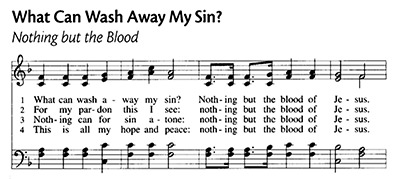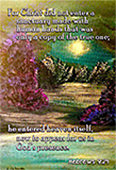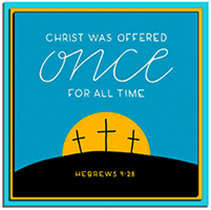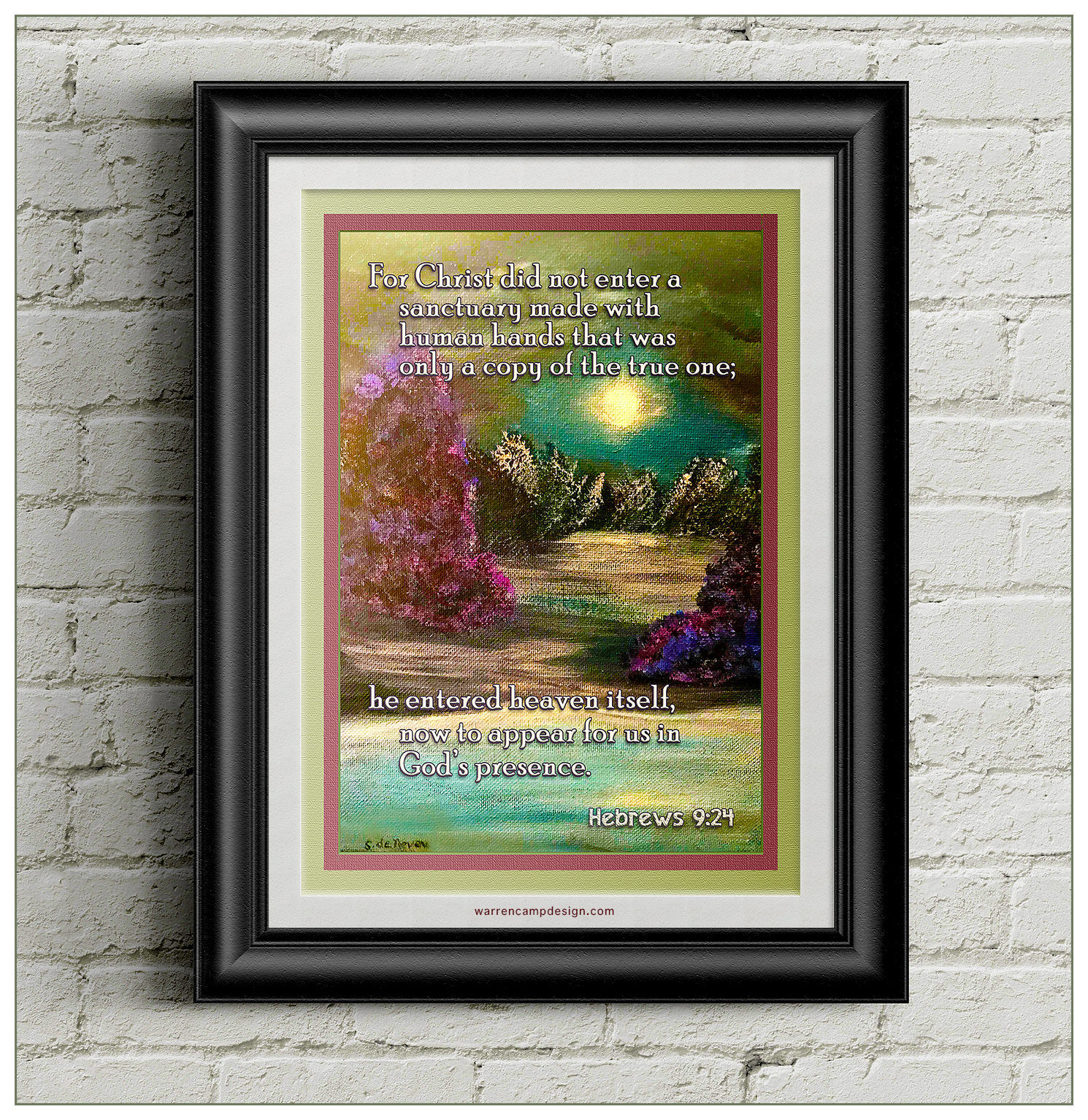Hebrews 9:16–28 . . .
“The Value of Jesus’ Shed Blood”
The concluding verses of chapter 9 continue to describe how Christ Jesus' new covenant, based on his sin-atoning sacrifice, is superior to the old covenant. Although the old covenant was based on limited sacrifices of animals, which had to be repeated and couldn't change man on the inside, Jesus' solitary death was a once for all, permanent, and completely effective solution to sin; it had the capacity to completely save his people from the penalty of sin. The fact that Jesus died only once to redeem us from our sinfulness also means that his next arrival won't involve a sacrifice; it'll be as a result of Father God's plan of man's final fulfillment.
Today's passage, 9:15–28, takes a slightly different slant than last week's, highlighted in "Christ's Blood in the New Covenant." Though the same term covenant (Greek diatheke) is also used in vv. 1–14, here it's treated more as a bequest or will, administered by a living executor after the death of the will-maker. Interestingly, but not coincidentally, Christ is seen as "the will-maker who dies" and "the executor who administers the estate." He was the sin offering itself as well as the high priest who offered it.
The new covenant was to do away with the animal sacrifices because they couldn't permanently restore God's relationship with man. A different sacrifice was needed to do this. This is the theme of chapters 9 and 10. While the author has already touched on the superiority of Christ’s sacrifice (7:27–28), in these chapters he describes it in great detail because it's one way the new covenant is far superior to the old, as highlighted in this short video from BibleProject called "Covenants."
Death, the Prerequisite to Resurrection (9:16–18)
There's good reason for our author to substantiate the need for our Lord’s death. Like a will that takes effect when someone dies, the new covenant was put into action at Jesus’ death, which marked the transition from the old plan to the new one. It canceled the old former obligations and its accompanying sins and summoned the heirs to receive their eternal inheritance, which God had promised them. As such, Jesus effectively brought together God and his people.
16In the case of a will, it is necessary to prove the death of the one who made it, 17because a will is in force only when somebody has died; it never takes effect while the one who made it is living. 18This is why even the first covenant was not put into effect without blood (9:16–18).
Here, our author makes the point that certain legal agreements take effect only upon the death of the testator, the will-maker. The relevance and purpose of this two-verse sentence is to demonstrate that a blood sacrifice from a death has always been required to confirm a committed covenant with God, which includes forgiveness of one's sins. In Warren's previous commentary, it was highlighted that animal sacrifice was required by God under the old covenant. It covered mankind's sin only temporarily; it couldn't effectively remove sin entirely. However, Jesus' sacrifice has the ability to fully and permanently cleanse believers from their sin.
Verses 16 and 17 argue that the covenant (viewed as a will) can't take effect without the death of the will-maker. This principle is seen even in the old covenant (vv. 18–22), since Moses, having read the Law to the people, took the blood of animals and sprinkled the Law scroll, the people, and everything connected with the tabernacle service (Leviticus 8:10, 19, 30). He thereby stipulated that the old covenant was based upon an animal's death. Without death, even the old covenant's insufficient forgiveness was unable to take effect, because, "without the shedding of blood there is no forgiveness" (v. 22).
God’s covenant with Israel was something of a legal contract that included God's promised inheritance or blessing (cf. 1:14; 6:12; 12:17). A benefactor's death is necessary in all last wills and testaments, before those who've been named in such a will are able to inherit what was promised therein. Looking closely at the old covenant's regulations, an animal's blood sacrifice was required so that Israelites could inherit what God had promised them: forgiveness of their sinfulness and their development of a righteous relationship with Almighty God (cf. Exodus 24:8, quoted in Hebrews 9:20, below).
In the same way that death is required to effectively execute a will, death was also required to implement the old Mosaic Covenant. When God made his covenant with the the Israelites, it was inaugurated by the sacrifice of innocent animals and the sprinkling of their blood. Although the old covenant was initiated by the shedding and application of sacrificial blood, the new covenant was initiated by Christ's blood, which he shed for the redemption of lost sinners to "set prisoners free."
God’s Priceless Gift (vv. 19–22)
Our inspired author exalts the supreme value of the Lord Jesus Christ's shed blood as the one and only way to give sinners the priceless gift of a thoroughly clean conscience and immediate access to the holy and loving presence of almighty God.
19When Moses had proclaimed every command of the law to all the people, he took the blood of calves, together with water, scarlet wool and branches of hyssop, and sprinkled the scroll and all the people. 20He said, “This is the blood of the covenant, which God has commanded you to keep.” 21In the same way, he sprinkled with the blood both the tabernacle and everything used in its ceremonies. 22In fact, the law requires that nearly everything be cleansed with blood, and without the shedding of blood there is no forgiveness (vv. 19–22).
The moment Moses was introduced to the old covenant he did two things: First, he read aloud to the people all of God’s laws that were to be obeyed. He insisted that they understood God's requirements, assuring them of their future goodness, so long as they obeyed his laws. If they neglected to obey them, he forewarned all of subsequent punishment. Second, using red wool and hyssop, he put some of the blood of young cows and goats on the scroll of God’s law, the tent, the priest's furnishings, as well as the people (Exod. 24:4–8). This effort served to make everyone clean.
We see in v. 21 how Moses also sprinkled with blood the tabernacle (or tent) itself and all the sacred vessels used in its worship. You'll find in the Law that almost all cleansing was done by means of blood. The "tabernacle" (also tent, booth, hut) was made, as per old-covenant requirements, largely of skins. It was designed to be portable, emphasizing the essence of its impermanence.
When the author says that "nearly everything be cleansed with blood" (v. 22), there were things that didn't require blood: (1) Fire could cleanse a variety of metal objects and (2) those too poor to bring even a small bird as a sacrifice could bring flour (Lev. 5:11–13). But for the most part, to make a person clean from sin, blood was required. So, for those too poor to sacrifice an animal, priests used blood of other sacrificed animals on their behalf and for all the people. A blood sacrifice to God was required to forgive sin; without blood, God wouldn't forgive anyone's sin. [Note: The author has repeated the word "blood" twenty-three times in the NIV, as shown on this list.] And, that's why there's 𝄞 "Nothing can for sin atone: nothing but the blood of Jesus."
"Hebrews" teaches us never to lose sight of the fact that the priesthood, sacrifices, and life of the old covenant are simply a rough copy. Christ is the original. This principle is given its clearest expression in v. 23, which refers to the Old Testament tabernacle, priesthood, and sacrifices being "copies of the heavenly things."
Jesus Provides an Infinitely Better Sacrifice (v. 23)
Following vv. 16–22, the author now brings contrast by stressing again the value of Jesus' death. It accounts for the prominence of blood and death in all secondary practices that point to heaven's realities. It also accounts for why, when the real thing takes place, animal sacrifices served their purpose and were no longer needed.
It was necessary, then, for the copies of the heavenly things to be purified with these sacrifices, but the heavenly things themselves with better sacrifices than these (9:23).
The sanctuary, whether a tent or tabernacle, and all that was in it, were "copies of the heavenly things" that required cleansing. To purify every object, blood had to be put on them. But, the blood of goats and young cows had absolutely no ability to clean what's in heaven. Sacrifices that were much better than those animal-blood offerings were necessary. As these earthly "copies" needed purification, so the heavenly realities needed purification. However, purification of sin can be successfully and permanently accomplished only by means of "better sacrifices," those that are undoubtedly better than animal sacrifices. Such a "better sacrifice" can be achieved only by God's once-for-all offering, made to everyone, through the blood of his Son, Jesus Christ, permanently providing sin's forgiveness.
Christ's death provides for us that requisite sacrifice as a valuable inheritance. His disciples inherit what's been promised them, following this same requirement: the Benefactor's death, so that people named in the will could receive their promised inheritance. God’s instructive word states clearly our inheritance; it must be performed under the auspices of the new covenant, which was planned and drawn up by our heavenly Father (v. 23).
Christ’s Three Appearances (vv. 24–28)
24For Christ did not enter a sanctuary made with human hands that was only a copy of the true one; he entered heaven itself, now to appear for us in God’s presence. 25Nor did he enter heaven to offer himself again and again, the way the high priest enters the Most Holy Place every year with blood that is not his own. 26Otherwise Christ would have had to suffer many times since the creation of the world. But he has appeared once for all at the culmination of the ages to do away with sin by the sacrifice of himself. 27Just as people are destined to die once, and after that to face judgment, 28so Christ was sacrificed once to take away the sins of many; and he will appear a second time, not to bear sin, but to bring salvation to those who are waiting for him (9:24–28).
Three times the author uses the verb "to appear," referencing three distinguishable appearances of Jesus. He mentions them in the order of the argument he pursues regarding Christ’s work: First, Christ has appeared once, for all, to put away sin as a direct result of his sacrifice (9:11, 26b); second, he now appears in the presence of God on our behalf (v. 24); and third, he'll appear, one day, so that he can save those who eagerly await him (v. 28).
Christ appeared on earth to pay man's sin debt. Unlike the repeated offerings of the Aaronic priesthood, Jesus has done this "once for all." That's why our author says that Jesus appeared "at the culmination of the ages" (v. 26). The work that Jesus had performed wasn't done in a special sanctuary that people on earth had made, which was simply a copy of that genuine sanctuary in heaven. Jesus made his one perfect sacrifice here on earth, then returned to heaven, at home with Father God, continually interceding on behalf of his people. Today he sits and stands next to God, to pray for all who trust in him (v. 24).
Thankfully, the new covenant promises eternity — "to bring salvation to those who are waiting for him" (v. 28). It requires nothing less than the blood of Father God’s Son, which he offered "for us" in a heavenly place "not made with human hands," once, for all time (vv. 24–26). Since our Lord Jesus Christ offered himself as the complete and perfect sacrifice for our sins by dying in our place, he can't die again. It's been prearranged by God, for man, as well as Jesus, to die only once (v. 27). Note the dissimilarity between Jesus' and man's one-time death: Although Christ died to bear the sins of many, he'll return to earth, very much alive. But with his return, he won't repeat his blood sacrifice but will impart eternal salvation to all who faithfully await his return (v. 28).
Christ's blood sacrifice foreshadows our eventual future with God: Jesus' death in the presence of God (v. 24) strips us of sin (v. 26) to ensure our inheritance, as the terms of God’s "will" (covenant) stipulate; our inheritance will be administered to us at Christ’s second coming (v. 28). So when the exalted Son of Father God returns to earth to complete his messianic work, he won’t judge sinners (v. 27). He'll save those who fully trust God with their lives (v. 28).
Closing Considerations
Here we are at the heart and soul of "Hebrews." Let's not miss the vital messages herein.
Just as the old covenant, involving the tabernacle and its priests, was validated by animal blood sacrifices, the new covenant is validated by Jesus Christ himself, with his own sacrificed blood. Originally, the high priest made annual sacrifices on the Day of Atonement on behalf of everyone. But Christ offered one blood sacrifice — his own blood — which was sufficient for ever. There's no earthly tent, tabernacle, or temple for Christ; his divine tabernacle is in heaven. So, Old Testament sacrifices evoked this perfect, one-time sacrifice of and by Christ himself.
Clearly, this epistle's message is straightforward: The author uses a comparison to explain why something new needed to replace something old. Herein, a new and superior priestly apparatus, designed to mediate between God and his people, was instituted because the old, ineffectual sacrificial system that Israel’s priests repeatedly used, year after year, continually failed to secure a permanent remedy for man's sin debt. The Israelites' Day of Atonement could only serve to remind its people of the old covenant's persistent spiritual failures. Thankfully, Jesus' blood sacrifice enabled God’s final victory over sin, once for all.
Mosaic Law was unable to provide true atonement for sin. It was impossible for bull's and goat's blood to take away sins because bulls, goats, and so on are mere animals, no matter how clean they might have been. Because animals weren't made in God's image and can't represent mankind, they couldn't have substituted for human beings. Yes, God accepted animal sacrifices from his people under the old covenant as a means of restricting his wrath (Lev. 1; 4; 16), but mankind's sins weren't actually punished in these animals. God passed over these sins in anticipation of the day in which he'd judge them in Christ (Romans 3:25). That sacrificial system was instituted not to deal with our sin but to point us to the One who satisfied his Father’s wrath on the cross. We'll see and appreciate that prophetic revelation in next week's commentary on 10:1–18.
The rending of the temple's curtain, during Jesus' blood-letting crucifixion, is ample evidence to document that his blood had been shed and that full atonement for everyone's sin was accomplished. Have you received the redemption or deliverance that our Lord Jesus has already made for your sin? Can you affirm that the value of his shed blood exceeds everything else that you value in your life?
- Q. 1 How is Christ's death like a "will" made good (vv. 16–18)? Who are the beneficiaries? What exactly is their inheritance?
- Q. 2 What are the "copies" in vv. 23–24? What's the real thing?
Hebrews 9:16–28
New International Version (NIV) or view it in a different version by clicking here.
— Listen to chapter 9, narrated by Max McLean.




